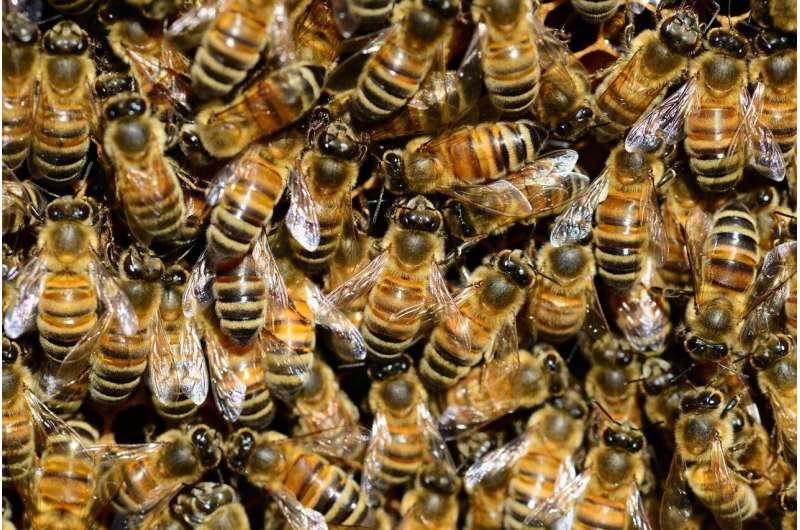This article has been reviewed according to Science X's editorial process and policies. Editors have highlighted the following attributes while ensuring the content's credibility:
fact-checked
peer-reviewed publication
trusted source
proofread
Study finds wild bees emerge from nests a week earlier for every 1°C rise in temperature

Warmer springs are causing British bees to wake up earlier, a new study has found, threatening the pollination of crops such as apples and pears.
The research—which is believed to be the largest of its kind in Great Britain—found that for every 1 degree Celsius rise in temperature caused by climate change, wild bees, such as bumblebees, emerge from their nests 6.5 days earlier on average.
As spring starts earlier and bees emerge closer to the start of the year, they may lose sync with the plants on which they depend, meaning there may be less food for them to consume. This means bees may not have the energy to pollinate crops effectively, or may miss crop blossom completely.
Ph.D. researcher Chris Wyver, of the University of Reading's School of Agriculture, Policy and Development, led the study, which is published in Ecology and Evolution.
He said, "Rising temperatures are making life tougher for bees. Warmer conditions mean bees emerge from hibernation earlier, but there may not be enough food to provide energy for them when they start buzzing about."
"Matching wake-up dates with plant flowering is vital for newly emerged bees because they need to find pollen and nectar to increase their chances of survival and produce offspring. A mismatch means bees cannot pollinate effectively."
"Less natural pollination could lead to farmers needing to use managed honeybees, meaning greater costs, which may be passed on to consumers. We could see even more expensive apples, pears and vegetables in supermarkets as a result."
Four decades of data
The study examined 88 different species of wild bees over a period of 40 years, using more than 350,000 individual recordings that showed shifts in emergence dates, both over time and in relation to temperature.
Data showed that some bees emerge earlier than others as different species of bee respond differently to the changing temperature. On average, the 88 species are emerging 4 days earlier per decade.
With winters projected to be between 1 and 4.5°C warmer and up to 30% wetter by 2070, according to the Met Office, spring is likely to continue to start earlier and bees will continue to become active earlier in the year.
The shift in bee emergence will also have a greater effect on plants that are heavily dependent on pollination, such as apple trees, which may not be ready to flower by the time hibernation ends.
FruitWatch
Like with bee emergence dates, understanding how climate change affects when flowers bloom on crops is also important because it can affect how well they are pollinated.
To learn more about when fruit trees flower, Chris and colleagues from the University of Reading and Oracle for Research have set up FruitWatch, a project that encourages people to report when fruit trees in their gardens, at their parks or allotments, start to flower. The submissions—of which more than 6,500 have been received in two years—will help the research team develop a greater understanding of the role climate change has on the flowering of fruit trees and pollination from bees.
More information: Climate-driven phenological shifts in emergence dates of British bees, Ecology and Evolution (2023). DOI: 10.1002/ece3.10284
Journal information: Ecology and Evolution
Provided by University of Reading


















